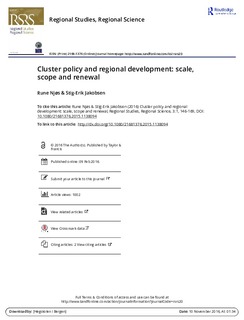| dc.contributor.author | Njøs, Rune | |
| dc.contributor.author | Jakobsen, Stig-Erik | |
| dc.date.accessioned | 2018-02-01T15:18:31Z | |
| dc.date.available | 2018-02-01T15:18:31Z | |
| dc.date.issued | 2016 | |
| dc.identifier.citation | Regional Studies, Regional Science 2016, 3(1):146-169 | |
| dc.identifier.issn | 2168-1376 | |
| dc.identifier.uri | http://hdl.handle.net/11250/2482189 | |
| dc.description | - | |
| dc.description.abstract | Consistent with Marshallian/Porterian theories, the Norwegian cluster policy has been linked to the development of specialized regional industry environments. Cluster projects are relatively sector-specific entities often supporting (already) strong regional industries and sectors. Following a review of the current literature on clusters and innovation, and informed by evolutionary thought, we argue that such constellations of specialized clusters may hamper the long-term innovation ability of regions. In a conceptual discussion of cluster evolution and its links to innovation and regional path renewal, we argue that special emphasis – both theoretical and political – has been placed on the geographical scale of clusters, but there has been less emphasis on scope. Accordingly, we present three theory-based strategies for cluster evolution and link these to regional development and innovation by assessing their impact on regional path renewal. We illustrate our argument empirically using examples from the Norwegian Centre of Expertise (NCE) cluster programme. | |
| dc.language.iso | eng | |
| dc.rights | Navngivelse 4.0 Internasjonal | |
| dc.rights.uri | http://creativecommons.org/licenses/by/4.0/deed.no | |
| dc.title | Cluster policy and regional development: scale, scope and renewal | |
| dc.type | Peer reviewed | |
| dc.type | Journal article | |
| dc.date.updated | 2016-11-10T09:46:21Z | |
| dc.identifier.doi | 10.1080/21681376.2015.1138094 | |
| dc.identifier.cristin | 1334343 | |

